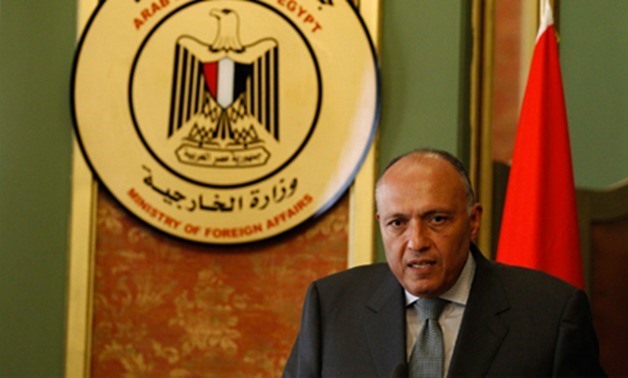
FILE – Minister of Foreign Affairs Sameh Shoukry
CAIRO – 15 June 2018: Egypt’s Foreign Minister Sameh Shoukry managed to preserve his position in Mostafa Madbouly’s new government which took oath before Sisi on Thursday for many reasons including handling several crucial issues regarding Egypt’s foreign Policy in a successful way.
Mediating in conflicts in Syria, Libya, Palestine and Iraq was one of the main roles occupied by the minister during the past period. Excessive efforts were exerted by Egypt during the past period to reach political solutions in these wars to guarantee a peaceful and quiet life for Arab people.
The discussions of the Ethiopian Grand Renaissance Dam (GERD) between Egypt, Sudan and Ethiopia, were also one of the major files that preserved Shoukry’s position as other meetings and discussions are supposed to continue during the coming period.
Egypt depends entirely on the Nile water for drinking and irrigation purposes, reiterating consistently its "historical right" to the river guaranteed in the 1929 and 1959 Nile agreements, which granted the country 87 percent of the Nile water and the right to veto or approve irrigation projects in the upstream countries.
Since 2014, the three countries (Egypt, Sudan and Ethiopia) have held several tripartite meetings and agreed on the Declaration of Principles. However, the disagreement among the countries is related to the filling and operation period of the dam; Egypt demands that this period be seven to 10 years, while Ethiopia insists on a maximum of three years.
Egypt’s average water per-capita is expected to drop from 663 cubic meters per year to 582 cubic meters by 2025, according to the Central Agency for Public Mobilization and Statistics (CAPMAS). Addis Ababa, however, claimed that the dam is necessary for Ethiopia’s development and will not harm downstream countries.
In 2011, Ethiopia started the construction of the 6,000-megawatt Renaissance Dam over the Blue Nile River, one of the major sources of water that forms the Nile River downstream. Concerns have risen in Cairo and Khartoum over the negative impact the Ethiopian dam will have on their historic Nile water share, amounting to 55.5 billion cubic meters in Egypt only, in accordance with the historic 1959 agreement with Sudan.
Shoukry is expected to preserve Egypt’s water share of the river Nile during on-going dialogues between the three countries.
As for the Palestinian-Israeli conflict, Egypt has been exerting constant efforts to support Palestinians and bring peace to the Gaza Strip, where Palestinians are killed by Israeli forces along the Gaza-Israel fence.
Several reconciliation attempts were signed in Cairo. In October 2017, a historic reconciliation was signed between Palestinian rival factions Fath and Hamas in order to achieve more stability within the Palestinian land and authorities.
On September 17, the Hamas movement announced the dissolution of the administrative committee in the Gaza Strip, inviting the Government of National Reconciliation to assume its duties and hold general elections. The movement affirmed it would comply with the Social Reconciliation Accord signed in 2011.
Palestinian President Mahmoud Abbas said that there is no country as vital to the Palestinian cause as Egypt due to its historical and political position in the region. “Egypt has an opinion, a position and an interest in the Palestinian cause,” said Abbas.
Regarding the Libyan issue, Egypt has hosted several meetings to bring the conflicting factions to the negotiating table, alongside members of Tobruk’s House of Representatives, to resolve the Libyan crisis and amend the Skhirat Agreement, which aims at ending the Libyan civil war.
Libya, which is struggling to get through the critical political situation that it has been experiencing since 2011, is not only trying to unify its army, but is also longing to revive its political functions by conducting presidential and legislative elections by mid-2018.
On May 1, Libyan House of Representatives speaker, Aguila Saleh, said that holding a presidential election in Libya before the end of 2018 is the only solution to solve Libya’s political crisis, especially since it is difficult to reach a real political agreement in Libya soon.
In an interview with a Libyan TV channel, Saleh stressed that he will present the case before the Libyan House of Representatives for holding an election to respond to the demands of the Libyan people.
Besides these major files and conflicts, Shoukry also is expected to enhance Egypt’s relations with the European Union, Russia and the United States during the coming period.

Comments
Leave a Comment